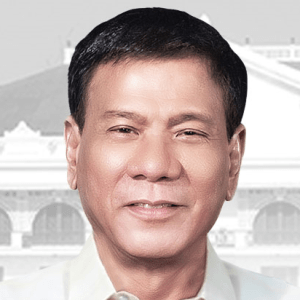
Rodrigo Duterte
Lawyer and politician Rodrigo Duterte served seven terms as mayor of Davao City in the Philippines. In 2016, he became the 16th president of the Philippines.
Who Is Rodrigo Duterte?
Rodrigo Duterte was born on March 28, 1945, in Maasin, Southern Leyte, Philippines. The son of a regional governor, he graduated from law school in 1972 and joined the
City Prosecution Office of Davao City. Duterte became Davao City mayor in 1988, and was reelected six times after forging a reputation for being tough on crime. He earned a decisive victory in his country's 2016 presidential election, but soon drew criticism for his support of extrajudicial killings and threats to cut diplomatic ties with the U.S.
Early Years
Rodrigo Roa Duterte was born on March 28, 1945, in Maasin, Southern Leyte, Philippines. His father, Vicente, served as a local mayor and governor, and his mother,
Soledad, was a teacher and a community activist.
Prone to misbehavior, Duterte was twice expelled from elementary school. He managed to channel his temper somewhat by the time he attended Lyceum of the Philippines
University, where he was influenced by Communist Party of the Philippines founder José María Sison. Duterte went on to study law at San Beda College, earning his
degree in 1972 despite claims that he shot a classmate.
Davao City Mayor
Duterte's rise from the legal ranks to politician began when he was named special counsel at the City Prosecution Office of Davao City in 1977. He became assistant
city prosecutor two years later, and in 1986 he was elected vice mayor of Davao City.
That same year, President Ferdinand Marcos was ousted in the "People Power Revolution," fueling an increase in crime that was particularly rampant in Davao City.
Elected mayor in 1988, Duterte sought to crack down on criminal activity by imposing a strict curfew and drinking laws. Additionally, he permitted the actions of a
vigilante "death squad" — often referred to as the "Davao Death Squad" and “Duterte Death Squad” — that reportedly killed more than 1,000 suspected drug dealers and gang members over a 20-year span.
Nicknamed the "Punisher" for his controversial methods, Duterte nevertheless was successful in reducing crime. Furthermore, he was credited with helping to make Davao
City cleaner by enforcing a smoking ban, and for his LGBT-friendly measures. His popularity was such that he served seven terms as mayor, sidestepping term limits with
stints as a congressman and vice mayor, and drew huge ratings with a weekly television program.
Presidential Campaign
After initially dismissing the idea he would run for president, Duterte reversed course and threw his hat into the race in late 2015. Among other promises, he said he
would establish a new federal parliamentary government and revive the country's steel industry.
However, the substance of his campaign was quickly overshadowed by a series of outrageous statements. He insisted he would massacre criminals and refused to apologize
for a joke about the rape of an Australian missionary. His brashness invited comparisons to Donald Trump, who was simultaneously running his own unfiltered campaign
for president in the United States.
The strategy proved effective, as Duterte nearly doubled the votes compiled by his two closest opponents. In May 2016, he was officially named the 16th president of
the Philippines, and the first from its southern island of Mindanao.
Philippines President
After taking office, Duterte signed an executive order to provide full disclosure of government records and transactions and announced plans to decongest airports.
Vigilante attacks continued under his watch, and thousands of criminals reportedly surrendered to authorities. Viewed as a tough, effective leader, Duterte scored a 91
percent approval rating in late July.
However, despite being subjected to greater international scrutiny in his new role, Duterte refused to scale back his incendiary rhetoric. Among his headline-making
comments, he lashed out at U.S. President Barack Obama over mention of the extrajudicial killings, and compared himself to Hitler for his desire to exterminate drug
addicts.
Duterte also threatened to shake up longtime alliances with his words. Upon a state visit to China in October, he announced that he was "separating" with the U.S. and
aligning himself with the "ideological flow" of his host country. Although he later softened those remarks, he left many wondering whether he would
attempt to tip the balance of power in the Pacific region.
Duterte grew more receptive to rekindling ties with the U.S. following the 2016 election of President Trump, who invited his Filipino counterpart to the White House in April 2017. In November, Duterte met with Trump at the Association of Southeast Asian Nations summit meeting in Manila. According to Duterte's spokesman, the two leaders discussed the ongoing problems with rampant drug use in the Philippines, but did not broach the subject of human-rights violations. The U.S. president chose to focus on areas of common ground, noting, “We’ve had a great relationship."
Family
Duterte was married to former flight attendant Elizabeth Zimmerman from 1973 until an annulment was granted in 2000. Two of their three children, Paolo and Sara, followed
their father into politics. Additionally, Duterte has a daughter with his common-law wife, Honeylet Avanceña.




